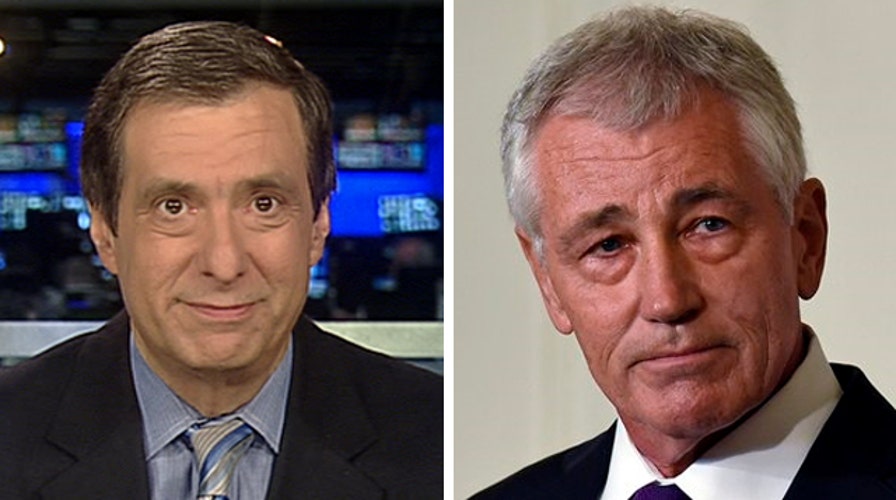Kurtz: White House spin obscures Hagel firing
'Media Buzz' host on press reaction to Defense Secretary's resignation
From the moment word leaked that Chuck Hagel had been fired, the spinning began in earnest.
Those ubiquitous senior administration officials wanted it clear that the president had chosen to oust his Defense secretary, thus giving him credit for a post-midterm shakeup and a new aggressiveness in the war on terror. That’s how Washington works: the president has full confidence in his Cabinet members until he, uh, doesn’t.
And if Hagel’s reputation gets scuffed up in the process, well, politics ain’t beanbag. I do wonder, though, why journalists let unnamed sources more or less trash a guy on his way out from behind a curtain of anonymity.
In fact, there were dueling leaks, with a separate set of anonymous voices from the Pentagon, even though the White House has the bigger megaphone.
The only amazing thing, in retrospect, is that the tremors from Hagel’s planned firing weren’t picked up earlier, well before the New York Times disclosed his dismissal yesterday morning.
Here’s the dominant spin in a nutshell, from an MSNBC story: “The White House reportedly lost confidence in Hagel less than two years after his nomination. ‘He himself was uncomfortable with the position,’ said NBC News’s Jim Miklaszewski.”
It’s true that the former Republican senator from Nebraska never seemed like the right fit. He simply wasn’t much of a spokesman on military policy, even when the threat of ISIS was dominating the news. Why have a Pentagon chief who fades into the woodwork?
The more generous spin, which the White House spread like icing across the baked cake of Hagel’s departure, is that the mission had changed. Thus, the New York Times:
“The officials characterized the decision as a recognition that the threat from the militant group Islamic State will require different skills from those that Mr. Hagel, who often struggled to articulate a clear viewpoint and was widely viewed as a passive defense secretary, was brought in to employ.
“Mr. Hagel, a combat veteran who was skeptical about the Iraq war, came in to manage the Afghanistan combat withdrawal and the shrinking Pentagon budget in the era of budget sequestrations.”
Okay, that’s true. But a Pentagon chief needs to be able manage military operations at any time, as the renewed American involvement in not just Iraq but Syria makes clear.
So here’s the kinder, gentler spin: “‘The next couple of years will demand a different kind of focus,’ one administration official said, speaking on the condition of anonymity. He insisted that Mr. Hagel was not fired, saying that the defense secretary initiated discussions about his future two weeks ago with the president, and that the two men mutually agreed that it was time for him to leave.”
My definition of fired is when you ultimately don’t have a choice about packing up your office. As for the counterspin, the Times has that too:
“But Mr. Hagel’s aides had maintained in recent weeks that he expected to serve the full four years as defense secretary. His removal appears to be an effort by the White House to show that it is sensitive to critics who have pointed to stumbles in the government’s early response to several national security issues, including the Ebola crisis and the threat posed by the Islamic State.”
The Washington Post, to its credit, quickly got an on-the-record assessment from an old Hagel pal:
“Sen. John McCain,R-Ariz., who is slated to take over as chairman of the Senate Armed Services Committee in January, said that Hagel ‘was frustrated with aspects of the administration’s national security policy and decision-making process,’ citing ‘excessive micro-management’ on the part of the White House.
“McCain noted that Hagel’s predecessors as defense secretary — Robert M. Gates and Leon E. Panetta — had both likewise complained in their memoirs about excessive political interference from White House aides.”
The Post goes on to describe Hagel’s “hands-off approach to battlefield operations,” contrasting him with Don Rumsfeld:
“That may have contributed to a view among some senior uniformed leaders of Hagel as a lackluster leader. One defense official, speaking on condition of anonymity, said many in the military saw the Nebraskan as ‘a perfectly acceptable but certainly not exciting’ manager.”
A defense official, giving his boss a little elbow on the way out.
Politico delves into some behind-the-scenes clashing:
“While a senior administration official on Monday praised Hagel’s ‘steady hand’ during his 22 months on the job, Obama and his inner circle never fully integrated Hagel into the decision-making process and did not hide their concerns about him.
“A senior defense official acknowledged to POLITICO that there had been policy differences between Hagel and National Security Adviser Susan Rice, but said no single disagreement had prompted Hagel’s departure.
“‘Did he and Rice agree on everything? No — but that’s normal, that’s healthy. This is not about him vs. Susan Rice,’ the official said. ‘The secretary is not resigning in protest.’”
The president and his outgoing Pentagon man praised each other at the public announcement. That’s the way it goes. The whispering to reporters provided a much different story.





